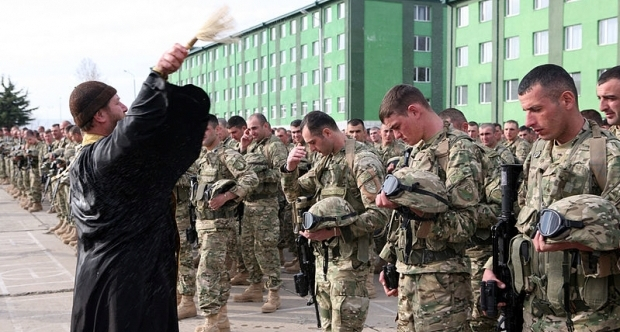
As Putin Faces Added Crises, NATO Can Push Georgia’s Membership Bid, Analysts Say
As the United States and NATO ponder how best to support a democratizing Ukraine against Russia’s ongoing attacks, the crisis over Ukraine has raised the stakes on an adjacent issue – whether NATO should accept Georgia’s eager request to join the alliance. For six years, NATO has been quietly stalling Georgia’s membership application. While many members, led by the United States and Poland, favor accepting it, France and Germany say Georgian accession to NATO would risk provoking retaliation by Russian President Vladimir Putin.
The debate over Georgia has revived after NATO last week announced its latest step in slow-rolling Georgia’s application. For a sixth year, the alliance’s secretary-general announced, NATO will withhold the formal precursor to membership (called a Membership Action Plan, or MAP) in favor of a “substantive,” but still undefined program of cooperation and support for Georgia.
The Georgian government voiced the patience to which it has no alternative. “It seems NATO has a rather moderate approach towards enlargement,” deadpanned Tbilisi’s minister for European and Euro-Atlantic integration, Alexi Petriashvili. The new cooperation under discussion is “not really what the Georgia authorities aspire to,” he said, according to the Tbilisi-based website Civil Georgia.
Others are less reserved. In an essay for the Atlantic Council, former Georgian foreign minister Tedo Japaridze warns that NATO’s caution is starting to go too far. It “risks being a danger – to Georgia’s political stability and to the credibility of the transatlantic alliance,” Japaridze writes. If the United States has decided not to push NATO allies into offering Georgia a Membership Action Plan as the next formal step toward membership, it should offer a package of support that, without the MAP label, achieves the same goals, he urges.
Because Georgia signed an association agreement with the European Union last week, it is likely to come under increased pressure from Putin’s government, the Atlantic Council’s Damon Wilson says. He urges the alliance to step up its security support for Georgia by putting NATO forces, including US troops, on the ground.
NATO’s stall on Georgia’s campaign for membership began in 2008, soon after the alliance’s leaders formally welcomed Georgia (along with Ukraine) as a candidate. Exactly eighteen weeks after that announcement, Russia invaded Georgia, occupied its regions of Abkhazia and South Ossetia, and recognized them as independent states. Ever since, NATO has withheld a Membership Action Plan (or MAP), instead building cooperation with Georgian authorities less formally, and at a measured pace.
The Kremlin has noticed. In 2011, Putin’s chief ally, then-President Dmitry Medvedev, said in a speech to army troops that Russia’s 2008 invasion of Georgia had stopped NATO from accepting any more former Soviet republics as alliance members.
Scholars Edward Joseph and Mamuka Tsereteli suggest a striking work-around to NATO’s deadlock over whether to offer Georgia the membership plan and thus further formalize its candidacy. NATO leaders at their summit in September should declare “that Georgia can be admitted to NATO at any given moment without a MAP,” they write in an article for the Atlantic Council. “This would avoid providing Moscow with any pretext for further chicanery in the Caucasus, such as annexing South Ossetia and its fellow breakaway region, Abkhazia. At the same time, by removing the impediment of a MAP, such a step would restore the faith of Georgian leaders and the public in the vision of ‘joining the West.’”
More acutely than before, both the Ukraine and Georgia policy choices boil down to one question: What middle path has the best chance of deterring Putin from further assaults against those 20th-century Soviet imperial territories (sorry, Soviet republics) where the Kremlin insists it has special rights to intervene? Confronting Putin too brusquely risks provoking violent retaliation or war that might yet be avoided. Opposing him too weakly risks telling him that he might safely attempt some further aggression.
Joseph and Tsereteli say newly complex challenges for Putin, following Ukraine’s pro-democratic revolution of last winter and spring, create some new maneuvering room for the West in confronting him. “With the outcome in Ukraine so uncertain, and with more serious Western sanctions a possibility, Putin cannot afford now to open another front with the West,” they write. “Therefore, caving in to Putin on Georgia is unnecessary and counterproductive, serving only to embolden the Russian leader in Ukraine, the Caucasus and elsewhere. In other words, hesitation over Georgia is as dangerous as headlong recklessness.”
James Rupert is an editor at the Atlantic Council.
Image: A Georgian Orthodox priest offers a blessing to Georgian soldiers as they complete training with US Marines in April 2011 and prepare to join NATO forces in Afghanistan’s Helmand province. US Marine Corps/Wikimedia Commons
